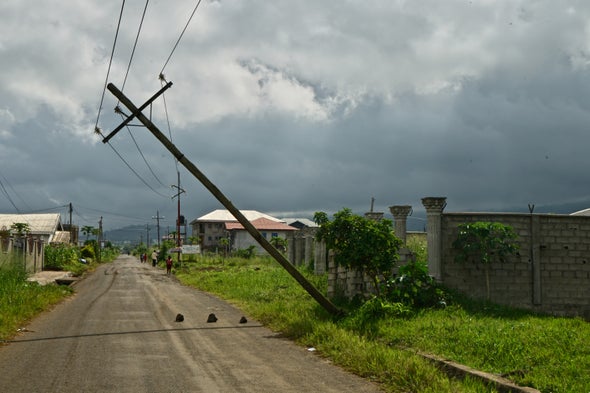Credit: Giles Clarke Getty Images COVID-19 has spurred massive changes in how the world works, learns and does business—changes made possible by the internet and digital infrastructure.
But without power, there is no internet. The entire digital ecosystem relies so heavily on reliable, affordable electricity, from home internet connections to the base stations that underpin cellular networks to the data centers that store the internet’s content. This means that countries with weak power infrastructures—which were already struggling to compete in the new digital economy—are facing bleak prospects in a post-lockdown world in which Zoom, Dropbox and Google Classroom are the new office or school.
Sub-Saharan Africa, where the digital transition has long been touted as a way to leapfrog traditional infrastructure, is especially vulnerable to falling behind. Chronic challenges in the power sector here—such as low electrification rates, high prices and appalling reliability—have significantly impacted the region’s digital competitiveness. Advertisement And COVID-19 is already widening this gap across the region. Lack of electricity, for instance, is undermining Kenya’s ability to deliver its remote learning initiative, while professionals stuck working from home are faced with frequent internet disruptions due to a weak power grid that has been impacted by heavy rains, vandalism and technical faults during the lockdown. Even South Africa, which has by far the most power capacity on the continent, will struggle to power basic mobile data for simple WhatsApp calls once its dramatic “load-shedding” program of scheduled countrywide blackouts is reinstituted after the lockdown ends.
The power-internet gap in sub-Saharan Africa will only get wider in an increasingly digital post-COVID world, if current energy system challenges remain unaddressed. This vicious cycle in the power-internet nexus is best exemplified by the data centers that sit at the core of the internet’s infrastructure—centralizing data storage, computing power and networking equipment. Data centers drive energy efficiency in the digital ecosystem as they concentrate equipment and processes, but as such they are large power consumers with strong sensitivity to changes in electricity cost and reliability. In fact, power generally represents two thirds of their operating costs.
Demand for more Africa-based data centers is growing dramatically to serve the continent’s burgeoning internet use with low-latency and high-bandwidth connectivity. Africa’s data center industry is expected to grow to 600 megawatts in 2020—and just that growth alone represents a projected capital investment of more than $1 billion in the region. Notably, it is local African businesses, including Vodacom/Safaricom, […]
